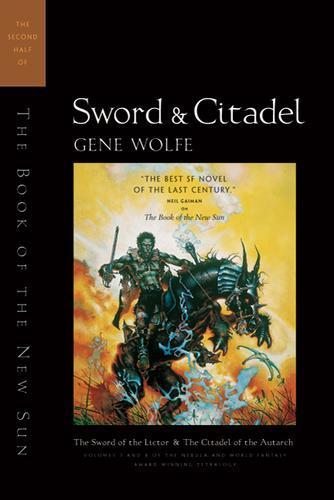Dysmorphia reviewed Sword & Citadel by Gene Wolfe
Review of 'Sword & Citadel' on 'Goodreads'
5 stars
My three favorite novels in the world are Dune by Frank Herbert, The Name of the Rose by Umberto Eco, and The Book of the New Sun by Gene Wolfe. I bet that many of you have read, and many more have heard of, the first two, but I wonder how many have read the last. The Book of the New Sun is less accessible than The Name of the Rose and weirder than Dune. The mind-bending future world, where the sun is so close to dead that you can see the stars in the daytime, is on par with Dune in its richness and complexity. The (mostly religious) philosophy, which the characters often discuss in casual conversation without it seeming contrived, is on par with The Name of the Rose or better. But the characterization is better than either. Although the main character is male, the female characters are …
My three favorite novels in the world are Dune by Frank Herbert, The Name of the Rose by Umberto Eco, and The Book of the New Sun by Gene Wolfe. I bet that many of you have read, and many more have heard of, the first two, but I wonder how many have read the last. The Book of the New Sun is less accessible than The Name of the Rose and weirder than Dune. The mind-bending future world, where the sun is so close to dead that you can see the stars in the daytime, is on par with Dune in its richness and complexity. The (mostly religious) philosophy, which the characters often discuss in casual conversation without it seeming contrived, is on par with The Name of the Rose or better. But the characterization is better than either. Although the main character is male, the female characters are far more real, vivid, and varied than almost anything I've encountered in fiction, and particularly science fiction.
The book is full of hints and allusions and puzzles. Despite what some readers may say, all the pieces are there and it's quite possible to put them together, though it might take a second read-through and some thought. I think many readers come away frustrated because they read the first volume alone and find that they have more questions than answers. There's also Gene Wolfe's love of obscure vocabulary--he doesn't make up words, he just resurrects them. I liked learning that an epopt is the opposite of a neophyte and that a carnifex is another word for executioner. You can get by with context, but if you're a word nerd the OED will beckon you. Every now and again the narrative pauses while the characters read a story from a book of tales or have a story-telling context. The narrator-main character tries to fool you into thinking that it's just an interlude included for his sense of completeness, but like many of things he says, it's just a subtle lie or perhaps self-deception.
It's one of those books that I wish fervently my friends would all read, because it's such a pleasure to discuss. I'm not sure I've done a good job of convincing anyone, but if you're a fan of difficult pleasures, this is a book for you.

